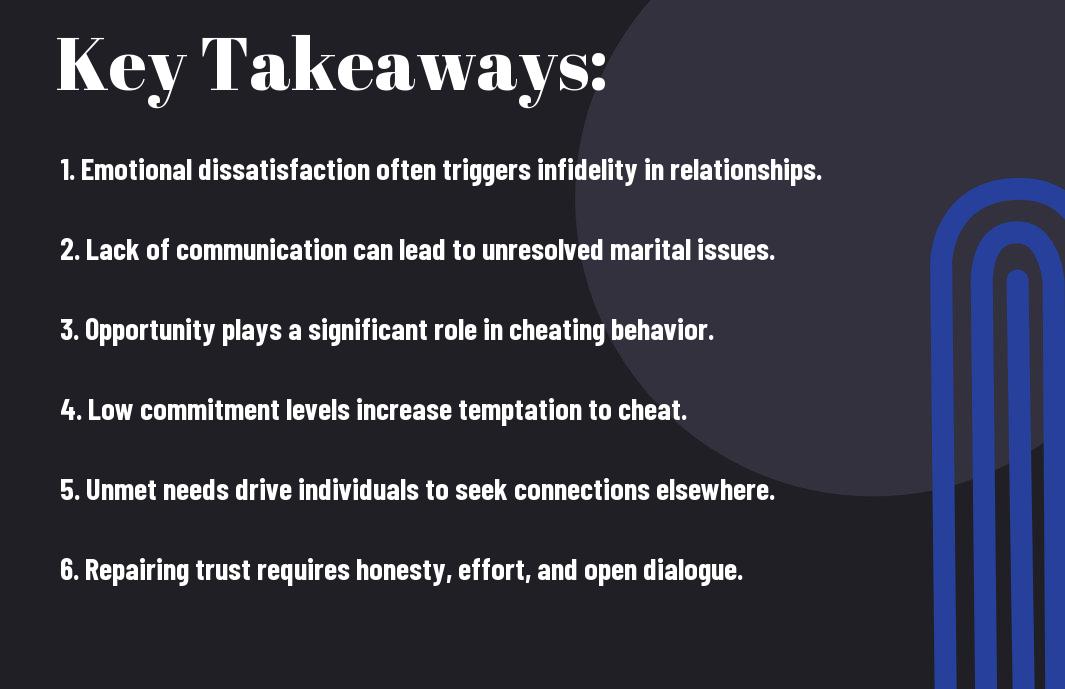It’s important to grasp the complexities behind infidelity to effectively address the challenges in your marriage. Understanding the root causes of why people cheat can provide valuable insight into your partner’s behavior and your relationship dynamics. By identifying factors such as emotional disconnection or unmet needs, you can work towards healing and rebuilding trust. This blog post will guide you through the reasons behind infidelity, offering strategies to strengthen your marriage and promote a healthier connection.
Key Takeaways:
- Infidelity often stems from unmet emotional needs that partners feel are not being addressed within the relationship.
- External factors, such as stress at work or life transitions, can increase the likelihood of someone seeking connection outside their marriage.
- Understanding the different types of infidelity, including emotional and physical, can help couples identify root issues more effectively.
- Open communication about desires and boundaries is crucial in preventing misunderstandings that can lead to infidelity.
- Often, cheating is a symptom of larger issues in the relationship, rather than just a desire for new experiences or partners.
- Couples therapy can provide a safe space to explore underlying issues and work towards healing and reconnection.
- Forgiveness and rebuilding trust are critical steps in moving forward after infidelity; both partners must be committed to the process.

The Psychology Behind Infidelity
The psychology behind infidelity is complex and often intertwined with emotional needs, personal struggles, and relational dynamics. Understanding these factors can shed light on the reasons why some individuals stray from their commitments, revealing deeper issues within their relationships. By examining the underlying motivations, you can better address any potential threats to your marriage and foster a more resilient partnership.
Emotional Triggers
One of the most significant reasons for infidelity can be emotional triggers. These triggers often arise from feelings of loneliness, insecurity, or unmet emotional needs within your current relationship. When you encounter situations or stimuli that exacerbate these feelings, it can lead to seeking validation or comfort outside of your marriage, ultimately jeopardizing your bond.
Relationship Dissatisfaction
Infidelity often stems from deep-seated relationship dissatisfaction. When you feel unfulfilled, neglected, or unloved in your marriage, the temptation to seek connection elsewhere becomes stronger. It is imperative to recognize that such feelings can lead to decisions that may seem justifiable in the moment but have lasting consequences.
In addition, if you find yourself experiencing persistent emotional distance or feeling unseen in your relationship, you may unconsciously search for intimacy and affection outside your marriage. This dissatisfaction can create a cycle where external validation becomes a substitute for the genuine connection you seek at home. Understanding these feelings is vital in addressing the root causes and preventing infidelity from escalating within your relationship.
Common Types of Infidelity
Assuming you are seeking to understand the various manifestations of infidelity, it’s important to note the following common types:
| Physical Infidelity | Engaging in sexual activities with someone other than your partner. |
| Emotional Infidelity | Forming deep emotional connections with someone outside of your marriage. |
| Cyber Infidelity | Using online platforms to engage in sexual conversations or relationships. |
| Virtual Infidelity | Participating in online gaming or chats that are emotionally or sexually charged. |
| Micro-Cheating | Engaging in behaviors that betray trust, typically without physical contact. |
Recognizing these types can help you better navigate the complexities of fidelity in your marriage.
Physical Infidelity
After identifying the signs of physical infidelity, you may feel devastated and betrayed. This type of infidelity involves actual sexual relationships outside your marriage, leading to significant emotional fallout and broken trust. Understanding the motives behind this behavior may help you address the core issues within your relationship.
Emotional Infidelity
On the other hand, emotional infidelity occurs when you or your partner forms a strong emotional bond with another person, often sharing intimate thoughts and feelings. This can create a profound disconnect in your marriage, as the emotional needs that should be met by your partner are sought elsewhere.
Due to the nature of emotional intimacy, it can often feel more dangerous than physical infidelity. You may find that these connections lead to serialized conversations, deep understandings, and shared vulnerabilities that overshadow your relationship. While it may start innocently, the emotional investment can pose a significant risk to your marriage, as it diverts crucial attention away from your partner and creates a divide. With awareness and open communication, you can navigate these challenges and foster a stronger bond with your spouse.
The Impact of Infidelity on Relationships
For many couples, infidelity can mark a turning point that determines the future of their relationship. The emotional and psychological fallout can create deep scars, leading to loss of intimacy, connection, and trust. While some couples may choose to rebuild their partnership, others may find it impossible to recover, ultimately leading to separation. Understanding these impacts is crucial for you to navigate the complexities of your marriage in the aftermath of infidelity.
Trust and Betrayal
Around the revelation of infidelity, trust is often shattered, resulting in feelings of betrayal that can linger indefinitely. You may struggle to feel secure in your relationship, as the foundation of trust has been compromised. Rebuilding this trust requires open communication and patience, as both partners work to heal and mend the emotional wounds inflicted by betrayal.
Long-term Consequences
Behind the immediate pain of infidelity lie numerous long-lasting effects that can hinder your relationship’s growth. These consequences often include persistent feelings of hurt, ongoing resentment, or even emotional withdrawal from your partner. As you navigate the aftermath of infidelity, it’s crucial to acknowledge that rebuilding your relationship may take time, effort, and professional support.
Further, the long-term consequences of infidelity can manifest in various ways that may not be immediately apparent. You might find yourself grappling with issues such as increased anxiety or decreased emotional intimacy. Repairing your relationship may become a drawn-out process that requires consistent communication and a willingness to address underlying problems. The journey to healing can be challenging, yet facing these issues head-on can lead to a stronger, more resilient bond with your partner if both are committed to the effort.

Reasons People Cheat
Keep in mind that infidelity can stem from various complex emotions and circumstances. Understanding these motivations is key to repairing your marriage. To explore deeper into Why do people cheat? – Rancho Counseling, you can discover that some people cheat due to emotional disconnect, the thrill of the chase, or even deeper psychological issues.
Opportunity and Temptation
Between the highs and lows of a relationship, some individuals may find themselves in situations where they encounter unexpected opportunities for infidelity. These moments of temptation can arise from meeting new people at social events or experiencing loneliness, leading one to stray from their commitment.
Seek for Validation
Against the backdrop of their insecurities, individuals often seek validation through the attention of others. This craving can stem from feeling undervalued or unappreciated in a relationship, prompting a search for affirmation in unhealthy ways.
And when you seek validation outside your marriage, it often leads to a cycle of negative emotions, including guilt and shame. Over time, this need for external affirmation can overshadow the love shared with your partner, causing a rift that becomes increasingly difficult to bridge. It’s important to recognize that while the longing for attention may feel positive temporarily, it can have devastating effects on your relationship if left unaddressed.
Preventing Infidelity
To effectively prevent infidelity in your marriage, it’s crucial to establish a strong foundation of trust and connection. This involves prioritizing open communication, fostering emotional intimacy, and managing conflicts in a constructive manner. By taking proactive steps to nurture your relationship, you can create a partnership where both partners feel valued and secure, ultimately reducing the temptation to seek fulfillment elsewhere.
Building Strong Communication
On your journey towards preventing infidelity, strong communication plays a vital role. Make it a point to discuss your feelings, expectations, and concerns openly. Active listening is key; ensure you validate your partner’s emotions and work together to find solutions. By creating a safe space for honest dialogue, you both foster mutual understanding and deepen your bond.
Enhancing Emotional Connection
Along with communication, enhancing emotional connection strengthens your marriage against infidelity. You should prioritize spending quality time together, sharing personal experiences, and engaging in activities that ignite joy and enthusiasm. This investment in your relationship cultivates a deeper understanding of each other’s needs and desires.
Infidelity often arises from unfulfilled emotional needs. By focusing on enhancing your emotional connection, you address key aspects such as vulnerability and trust. When you nurture a strong bond, you create an environment where both you and your partner feel understood and valued. This connection acts as a protective barrier against the challenges that can lead to straying outside of your marriage, reinforcing your commitment and love for one another.

Navigating the Aftermath of Infidelity
Once again, addressing the emotional fallout from infidelity can feel overwhelming. You may experience a whirlwind of emotions, including anger, betrayal, and sadness. It’s vital to communicate openly with your partner, allowing both of you to express your feelings and begin to comprehend the gravity of the situation. Understanding the nature of the betrayal can guide you toward healing, but it requires effort from both partners to rebuild what has been broken.
Healing and Rebuilding Trust
Along this difficult journey, healing and rebuilding trust is crucial to restoring your relationship. It demands transparency, consistent actions that affirm your commitment, and patience from both partners. Listening to each other’s feelings will help in developing a deeper understanding, making it easier to navigate the path toward reconciliation.
Professional Help and Counseling
At times, you may find it challenging to overcome the aftermath of infidelity on your own. Seeking *professional help and counseling* can provide the support you need to navigate this rocky terrain. A trained therapist can create a safe space for you to discuss feelings, mediate tough conversations, and offer strategies to rebuild your relationship. This guidance can be the tipping point to help you both regain trust and learn effective communication techniques.
With the assistance of a professional, you can gain perspective and insights that are vital in this process. They can equip you with the tools to understand both your emotions and your partner’s. Furthermore, a counselor can help identify underlying issues that may have contributed to the infidelity, enabling you to address them constructively. Engaging in therapy together fosters a stronger bond and a greater sense of accountability, every step forward strengthens your relationship and promotes healing. It’s a valuable investment in *not just your partnership but your individual well-being as well*, showing a commitment to overcome the challenges ahead.
Summing up
The journey to understanding infidelity can be challenging, yet it’s vital for you to address the issues that have driven you and your partner apart. By exploring the reasons behind cheating, you equip yourself with the knowledge needed to rebuild trust and strengthen your marriage. Acknowledging feelings of dissatisfaction, emotional disconnect, or unmet needs can help you both navigate this difficult path toward healing and reconciliation. Engaging in open communication and seeking professional guidance will empower you to create a healthier, more fulfilling relationship moving forward.
Q: What are the common reasons people cheat in a relationship?
A: There are several reasons individuals may choose to cheat, including emotional dissatisfaction, lack of intimacy, desire for novelty, or feeling unappreciated. Some may cheat as a response to personal issues such as low self-esteem or unresolved trauma. Others may seek validation or excitement outside their relationship. Understanding these underlying motivations can help couples address the root issues in their marriage.
Q: Can emotional infidelity be as damaging as physical infidelity?
A: Yes, emotional infidelity can often be just as damaging as physical cheating. When one partner forms a deep emotional bond with someone outside the marriage, it can lead to feelings of betrayal and insecurity. Emotional infidelity can create a disconnect between partners and may erode the trust necessary for a healthy relationship. Addressing both types of infidelity is important for healing and rebuilding the relationship.
Q: How can couples identify and address the signs of infidelity?
A: Couples can look for signs like changes in communication patterns, reduced intimacy, and increased secrecy. A sudden shift in behavior, such as spending more time on their phone or becoming defensive about schedules, can also be a red flag. Open and honest communication about feelings and concerns can help partners navigate these signs effectively, creating an opportunity for discussion and resolution before infidelity escalates.
Q: Is it possible to rebuild trust after infidelity?
A: Yes, it is possible to rebuild trust after infidelity, but it requires commitment and effort from both partners. This process involves open communication, understanding the reasons behind the infidelity, and taking responsibility for one’s actions. Couples may also benefit from professional help, such as marriage counseling, to guide them through the healing process and develop strategies to restore intimacy and trust.
Q: What steps can couples take to prevent infidelity in their marriage?
A: Couples can take several proactive steps to prevent infidelity, including fostering open communication, prioritizing emotional and physical intimacy, and regularly checking in with each other about their relationship needs. Establishing shared goals and maintaining a healthy balance between individual interests and couple time can also help strengthen the bond. Being aware of each other’s feelings and making adjustments as needed can create a more resilient partnership.
